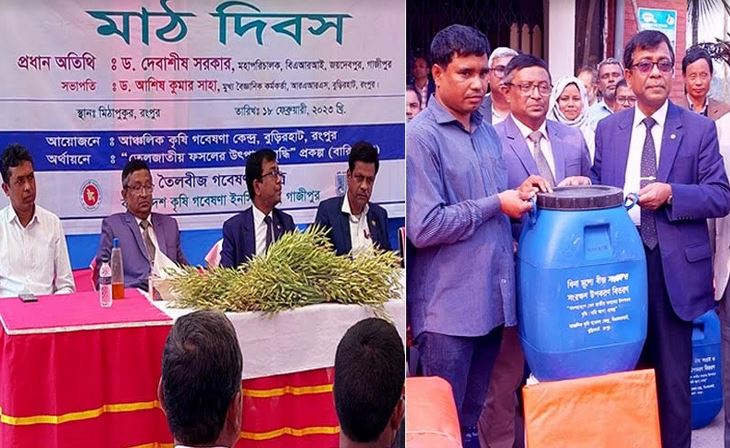
RANGPUR, Feb 19, 2023 (BSS) - Bangladesh Agricultural Research Institute
(BARI) Director General Agriculturist Dr. Debasish Sarker has urged farmers
to cultivate more BARI Sarisa-14 for increasing production of oil seeds to
meet edible oil demand locally.
"Necessary assistance and inputs are being provided to the farmers for
expanding cultivation of the highly profitable, short duration and high
yielding variety of mustard as an interim crop on fallow lands in between
Aman rice and Boro rice farming," he said.
The BARI Chief said this while addressing a farmers' field day function
titled 'Productivity of BARI Sarisa-14 and production technology' held at
village Tahiarpur in Mithapukur upazila here on Saturday afternoon as the
chief guest.
The Regional Agricultural Research Station (RARS) at Burirhat in Rangpur of
Bangladesh Agricultural Research Institute (BARI) organised the event.
Chief Scientific Officer of RARS of BARI at Burirhat in Rangpur Agriculturist
Dr. Ashis Kumar Saha presided over the function.
Principal Scientific Officer (PSO) of On-Farm Research Division (OFRD) of
BARI at Alamnagar in Rangpur Dr. Md. Al-Amin Hossain Talukder, PSO of RARS at
Burirhat Md. Anwar Zahid, PSO of OFRD of BARI at Gaibandha Dr. Abdullah Al
Mahmud and Senior Scientific Officer of Bangladesh Rice Research Institute
Dr. Md. Rakibul Hasan spoke as special guests.
The agriculturists said BARI Sarisa-14, evolved by BARI, is a high yielding
variety of mustard with a short life span of 75-80 days.
BARI Sarisa-14 can be cultivated as an interim crop in the high and medium
high lands that remain fallow between cultivation of Aman rice and Boro rice.
Farmer Md. Kamruzzaman said he has been cultivating BARI Sarisa-14 on his
cropland since 2019-2020 crop seasons with assistance of the RARS at Burirhat
to reap huge profits.
"I am getting 20 mounds (every 40 kgs) of BARI Sarisa-14 per acre of land,"
he said.
Farmer Md. Hossain Ali said he cultivated BARI Sarisa-14 on the same land
after harvesting short duration and high yielding BRRI dhan75 rice, got
excellent yield and transplanted Boro rice seedlings on time.
"Alongside reaping more profits, cultivation of mustard helps farmers get
edible oils, fodders, fuel and organic fertilizers," he added.
Dr. Rakibul said he would increase supply seeds of short duration and high
yielding varieties of BRRI dhan75 during Aman and BRRI dhan89 during Boro
seasons to promote mustard cultivation.
He suggested farmers produce and preserve seeds of BRRI dhan75 during Aman
and BRRI dhan89 properly following seed production technologies.
Dr. Saha said the three-crop technology extension program (Aman rice-BARI
Sarisa-14-Boro rice) based on BARI Sarisha-14 farming is underway to increase
crop intensity in Rangpur and Dinajpur regions where 60 exhibition plots have
been set up involving local farmers.
Later, the chief guest distributed one tarpaulin sheet and two drums to each
of the 28 successful mustard seed producing farmers of Rangpur division for
processing and preserving their produced seeds.